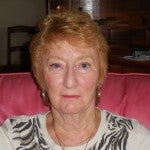Alzheimer’s and caregivers support groups
Published 5:56 pm Saturday, September 19, 2015
Somewhere in the late 1980s, I finally went to a support group to help me deal with problems arising from my mother’s diagnosis of Alzheimer’s disease. Back in those days (before President Reagan’s diagnosis), not many people knew much about the disease nor how to handle it. At the time, few people were willing to admit that Alzheimer’s disease was affecting their loved ones. A stigma was attached to “old timers” disease, but I was desperate. I needed information and I needed it NOW.
Only two of us desperate souls attended that day. The presenter had a well-planned agenda but had the good sense to let the two of us just “vent.”
Amazingly, human beings need to connect with others who are experiencing the same pain, no matter what the malady.
Ann and I connected. Her husband and my mother both had dementia. The conversation went
“Does he repeat the same thing over and over?”
“Yes, Does she?”
“Yes, and it drives me crazy!!”
“Does she put on clothes that don’t match? Sam was so aware of his looks before.”
“Yes, and Mom was always stylish. It drives me nuts!”
Notice I referred to myself as “crazy” or “nuts.” Caregiving for someone you love whose personality has changed can make you feel as if you are “losing it” yourself.
I was fortunate to find Ann because whenever we felt we were going out of our minds, we would call one another for support. Ann lived close by, so the sharing went beyond the support group. As the disease progressed in both of our relatives, Sam could no longer feed himself. Eventually Ann had to put him in a nursing home; she visited him every day and fed him, sometimes twice daily. Sam’s illness put him in a fetal position for four years — the stage I dreaded the most. Fortunately, for Mother, that stage never came.
After Sam died, I saw Ann in Walmart’s — her first time since Sam’s illness. Ann was wide-eyed, seemingly seeing the world for the first time, a world she had been isolated from during her husband’s illness. Ann and I continued to meet at the Caregiver’s Support Group: me, to get information; Ann, to help other caregivers. Years later, after my mother’s death, we both became involved in the Washington Alzheimer’s Walk.
Both resources still exist. The Caregiver’s Support Group meets every fourth Monday night (5:30 p.m. at Washington’s Senior Center). The Alzheimer’s Walk and Education Fair (Oct. 3, 9 a.m. to noon, at Redmen’s Lodge) continues to supply experts and information about dementia. Both places provide so much more information than was available decades ago.
Using available resources, sharing and talking about the behaviors helped Ann and me survive those years of caregiving. There is no quick fix to Alzheimer’s disease; there is no cure. The job is to learn ways to handle a loved one’s behavior and learn ways to help you both survive the years struggling with Alzheimer’s disease.
Emily Albera is co-chair of the Washington Alzheimer’s Walk and Education Fair, Oct. 3, 9 a.m. to noon, Red Men’s Lodge. For more information, contact her at 252-944-3446 or albera@gotricounty.com.






